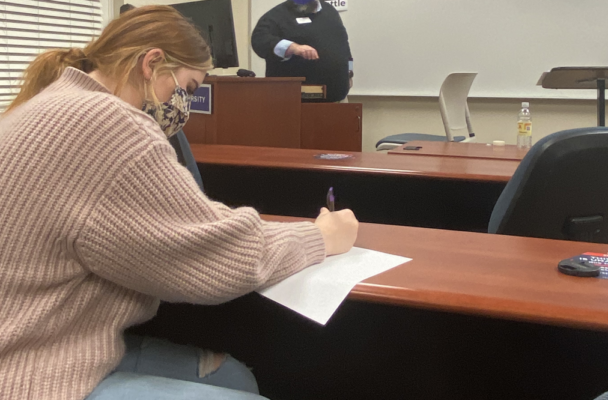Multicultural Affairs hosts Cultural Stereotypes Workshop

By Elise Colby
Organizations Editor
As a part of HPUNITY week, High Point University’s Multicultural Affairs and Office of Global Education hosted a Cultural Stereotypes Workshop. Senior Study Abroad Advisor Christopher Ferguson led a discussion on how we see, define and react to cultural characteristics to enhance interpersonal and intercultural communication.
“Talking about culture and cultural stereotypes are very deep topics,” said Ferguson.
“In order to better understand it, I want to talk about the two large parts of stereotypes: the cultural side and also what stereotypes are and how we form them.”
According to Ferguson, the tangible and conscious aspects of culture include the way we behave, visual
representation of art, music, self-expression and practices of religion. Contrastingly, another important concept is the idea of the unconscious and intangible aspects of culture, also referred to as “subjective culture,” which is driven by an individual’s values.
“The importance of talking about these distinctions is because they build upon each other,” said Ferguson. “If you think about a lily pond, you’ll notice the lily flower on the top of a lilypad, but what you don’t know about is below it and what is feeding the lilies. Culture is a deeply rooted and very difficult thing to change.”
Other important contrasts that were discussed are the two aspects of cultural characteristics and the two sides they embody, including generalization and stereotypes.
“When we talk about generalizations, we tend to characterize things having the same characteristics on a national level of people or a smaller group,” said Ferguson.
“Generalizations are effective and needed, but it’s important not to characterize a single group into one definition.”
The consequences highlighted by this discussion included negative behaviors in which people can become culturally narrow-minded and characterizing a group of people as being the same to a single culture, which can lead to prejudice and a strain on individual difference.
Generalization can be used to create flexibility and curiosity to communicate more effectively. Ferguson also highlighted the impact stereotypes have on certain groups and the outcome stress produces, preventing people from getting the help they need because they feel heavily categorized.
“Just because of who you are doesn’t equate to the personal effort someone puts in to get to where they are,” he said.
According to Ferguson, we can avoid stereotyping by practicing cultural curiosity and flexibility, allowing individuals to make generalizations instead of stereotypes.
“If we create rash judgments, it will lead to hardened beliefs just like a stereotype and that will prevent flexibility,” said Ferguson.
“We can ask ourselves if our assumptions are correct in various ways, such as asking an expert or Googling, which will allow us to verify and evaluate what we think and feel.”
For more information and workshop opportunities, students are encouraged to contact Ferguson at cferguso@highpoint. edu. Students who are interested in upcoming events can check HPU Connect or contact C.A.T. at cat@highpoint.edu.